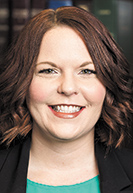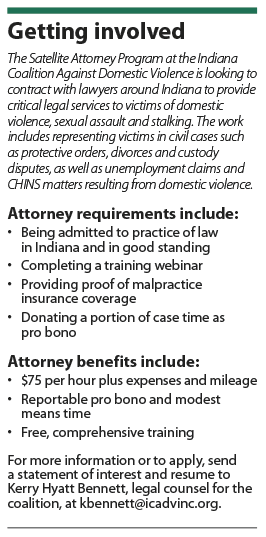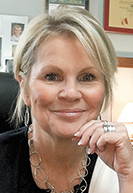Subscriber Benefit
As a subscriber you can listen to articles at work, in the car, or while you work out. Subscribe NowFor victims of domestic violence, going into court to face an abuser can be terrifying, but going in without counsel can be worse.
The victims do not know the rights and protections available to them under Indiana law, and they are often so worn down they cannot speak up or tell their story. In some counties, the courts almost disregard the accusations, which convinces some victims to quit fighting and go back to the person who caused their physical, emotional and mental pain.
 Willis
WillisKyli Willis, an associate at Mitchell Law Group in Indianapolis, knows well how fearful victims can be. She has served survivors of domestic violence as an attorney and in her prior career as a social worker, so she has seen the trauma that can be inflicted just by being in a courtroom with an abusive partner.
To help counteract this anxiety and danger, Willis makes herself into a barrier, physically positioning herself in court to stand between the victim she is representing and the abuser at the other table. Her client cannot see the abuser, and if the abuser tries to lay a hand on the victim, Willis will be in the way.
Willis is part of the Indiana Coalition Against Domestic Violence’s Satellite Attorney Program, which offers free civil legal services to low-income victims of domestic violence, sexual assault and stalking. The program has a network of just over 100 attorneys across Indiana and, since January 2016, has provided legal advice or counsel, including direct representation, in roughly 350 cases.
Now, the coalition is launching an effort to bring on more attorneys like Willis who can represent the survivors. ICADV is working to increase the number of attorneys available in the satellite program, especially in rural counties.
Frequently, the abuser will have the ability to hire an attorney, said Kerry Hyatt Bennett, legal counsel for the coalition. That individual will then likely appear to the court as rational, sensible and capable of giving the children a better home if custody is part of the dispute.
Conversely, unrepresented victims have not been able navigate against that to get what the law entitles them to have.
As an example, Hyatt Bennett pointed to the Indiana Civil Protection Order Act, which includes provisions allowing the victim to take temporary possession of the vehicle and home. This, in turn, can help provide some needed stability so the victim will not lose a job or be forced to move into a shelter. Other laws permit child support to include childcare and mandate equal division of assets in a divorce.
“It’s amazing, if you’re pro se and you need to get out of an abusive relationship, you’re not going to care about going after marital assets, right?” Hyatt Bennett said. “You just want the hell out.”
Holistic approach
The satellite program works closely with victims’ advocates in domestic violence agencies and shelters around Indiana. While the advocate is connecting the victim with services to help with employment, housing, medical and childcare needs, the satellite attorney will focus on addressing legal issues such as protective orders, divorce, custody and parenting time, as well as children in need of services cases resulting from domestic violence.
Hyatt Bennett described the approach as holistic. It is designed to remove the obstacles to self-sufficiency and keep victims from returning to the abusive relationship.
More immediately, having help from an attorney can make such a difference that even the victim’s body language will change.
Sara Mustaine, case manager at Safe Passage, Inc., headquartered in Batesville, has seen how unrepresented victims sit in court, alone and withdrawn, answering only “yes” or “no” to the judge’s questions. But with a lawyer standing beside them, the victims exhibit more confidence and do not worry about getting the court to believe their stories.
That self-assurance is important because in the southeastern portion of the state that Safe Passage serves, Mustaine said the courts can seem prejudiced against victims. At times the judges do not take the domestic violence cases seriously, victims are not believed, and if the abuser is from a well-known family, the scales can tip farther against the victim.
Advocates alone are limited on the assistance they can provide in a courtroom setting. They can help the victim write the impact statement and they can attend the hearing, but they cannot give legal advice.
“From a legal standpoint, if justice is not being served in the way we think it should, we have no voice,” Mustaine said. “If the justice system does not work for the victims like we think it should, then the victims feel like the only other option is to go back to the (abuser).”
Victims have ‘dents’
Hyatt Bennett echoed Mustaine in noting she is now seeing more victim blaming by some trial courts than she did when she started working in the field 20 years ago. There are judges who maintain sending the children home with the abuser is better than having them stay with the victim in a shelter, or they refuse to rule on an emergency protective order and instead set a hearing for two weeks later.
 Hyatt Bennett
Hyatt Bennett“Most survivors of any kind of trauma, most survivors of any kind of violence, especially those that have been in that situation for a while, they’ve got some dents, they have some issues,” Hyatt Bennett said. “It doesn’t mean that they aren’t survivors. I see an awful lot of victim blaming, much more so than I did when we first started.”
Additionally, changing attitudes in some courts might be a reflection of the fact that abuse can take many different forms, some of which are not outright illegal. Things like exerting financial control by opening credit cards or filing tax returns in the victim’s name without the victim’s knowledge, shaming or trolling the victim online, sabotaging the victim’s job or not allowing the victim to leave the house can all be part of domestic violence.
The victims’ attorneys, then, need to help the judges understand that the central issues are power and control. Hyatt Bennett explained that the lawyers need to connect the dots and show the court the pattern of coercion and terrorism that is present even when the abuser has never laid a hand on the victim.
At Hope’s Voice of Knox and Daviess County, case manager Cathy Bush has encountered different barriers in the rural communities’ legal systems than she found working in larger cities in Arizona and New Jersey. She counters those obstacles with education, helping law enforcement, landlords and court clerks understand the protections available to victims.
Currently, the agency has one attorney through the satellite program to call upon for help. Sometimes Bush will only need him to answer a legal question, but with divorce and custody cases, he will usually provide representation.
“It’s a much-needed program,” Bush said, adding that the satellite attorney Hope’s Voice has available is providing a great deal of help, but is overworked. “If I can find more attorneys, that would be wonderful.”
The satellite program trains the attorneys and, through a grant from the Victims of Crime Act, is able to offer a modest hourly rate of $75. In exchange, the lawyers are expected to provide some sort of pro bono service, whether that is through not charging for a couple of hours of representation or donating expenses for things such as travel and copies.
Willis loves being a satellite attorney. The work, she acknowledged, can be emotional and frustrating, particularly if the victim returns to the abuser. But, she added, the clients are extremely grateful for the help, and the attorneys have the chance to make a difference in somebody’s life.
Hyatt Bennett sees the satellite program as giving the victims an equal chance. “Sometimes justice does settle in your corner,” she said. “What I love about this (program) is that it allows justice to settle in their corner.”•
Please enable JavaScript to view this content.
